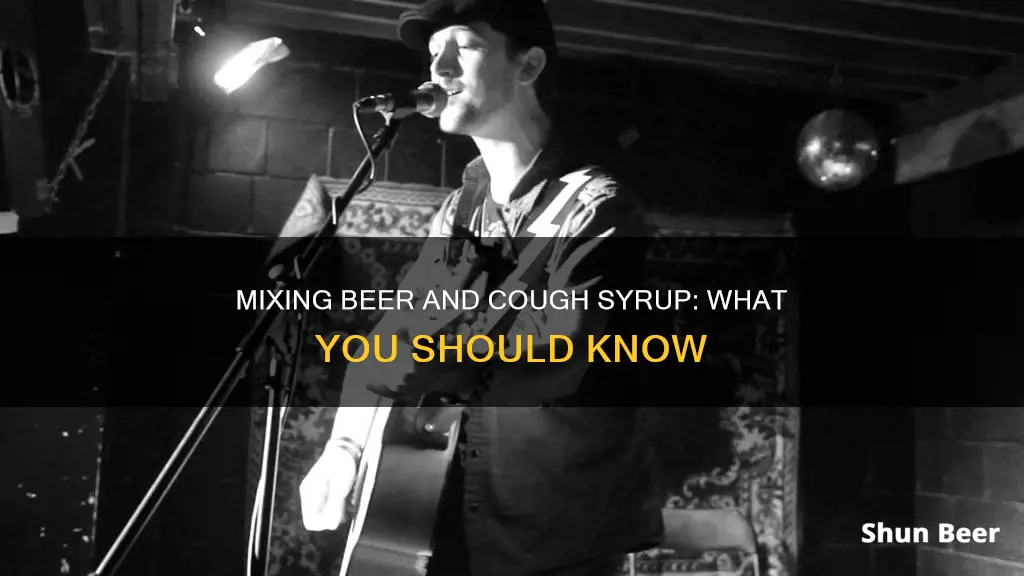
Drinking alcohol after taking cough syrup can be dangerous and lead to adverse health effects. Cough syrups often contain dextromethorphan, a central nervous system (CNS) depressant that causes relaxation, sleepiness, and a euphoric feeling—effects that are similar to those of alcohol. When combined, these substances can increase the risk of overdose, respiratory depression, brain lesions, memory and behavioral problems, and even death. Additionally, alcohol can worsen the symptoms of illness, cause dehydration, and weaken the immune system. Therefore, it is generally advised to avoid consuming alcohol while taking any cough medication.
| Characteristics | Values |
|---|---|
| Can you drink beer after taking cough syrup? | No |
| Why? | Increased dizziness, drowsiness, impaired coordination, and more severe effects if the cough medication contains alcohol |
| Dextromethorphan, an ingredient in some cough syrups, can have dangerous interactions with alcohol, increasing the risk of overdose, respiratory depression, and even death | |
| Cough syrups with codeine are controlled substances that have a high potential for abuse and dependence, leading to overdose and death | |
| Alcohol can cause symptoms of illness to worsen, cause dehydration, and weaken the immune system | |
| How long should you wait after taking cough syrup before drinking beer? | At least 24 hours to ensure the body has cleared most or all of the drug from the bloodstream |
What You'll Learn

Dextromethorphan and alcohol can cause irregular heart rate and seizures
Dextromethorphan is a medication used to suppress coughing. It is an over-the-counter drug that can be found in medications such as Robitussin, Delsym, NyQuil, and DayQuil. It is widely available in pharmacies without a prescription.
Dextromethorphan is a central nervous system (CNS) depressant, which means it causes relaxation, sleepiness, and a euphoric feeling. It is a drug that is widely abused, often in combination with alcohol. This combination is sometimes called "Robo-tripping" or "Skittling".
Mixing dextromethorphan with alcohol can have dangerous consequences. Both substances affect the body in a similar manner, intensifying the medication's psychoactive side effects. Dextromethorphan binds to NMDA receptors in the brain, which are involved in pain perception, learning, and memory. Alcohol also interacts with these receptors, and combining the two can greatly increase the risk of overdose and negative effects on the body.
One of the severe risks associated with mixing dextromethorphan and alcohol is irregular heart rate. Alcohol can increase the nervous system side effects of dextromethorphan, including dizziness, drowsiness, and difficulty concentrating. This combination can lead to a loss of motor coordination and sedation. Additionally, there is an increased risk of seizures. People who abuse both substances together are at a higher risk of experiencing seizures.
The combination of dextromethorphan and alcohol can also lead to other serious health issues, including toxicity, overdose, delusions, hallucinations, paranoia, delirium, hyperthermia, high blood pressure, coma, and even death. Therefore, it is strongly advised to avoid drinking alcohol when taking dextromethorphan. If you or someone you know is struggling with an addiction to this combination, seeking professional help is crucial.
Beer and Injections: What's Safe to Drink?
You may want to see also

Mixing cough syrup and beer can lead to increased drowsiness
Mixing Cough Syrup and Beer
Can lead to increased drowsiness
Cough syrup and beer should not be mixed. Combining dextromethorphan, a common ingredient in cough syrups, and alcohol can lead to increased nervous system side effects such as dizziness, drowsiness, and difficulty concentrating. This is because both substances are central nervous system (CNS) depressants, which cause relaxation and sleepiness. The combined side effects of these depressants can increase the risk of overdose, respiratory depression, and even death.
Dextromethorphan is a widely abused drug, often in the form of "purple drank," a cocktail of cough syrup, soda, alcohol, and hard candy. This combination is extremely dangerous, and those who mix these substances may need to reach out for professional help.
Even if an individual survives an overdose of dextromethorphan and alcohol, they may suffer from permanent consequences, including brain damage. Other possible side effects include hallucinations, paranoia, delirium, hyperthermia, high blood pressure, seizures, and coma.
It is advised to avoid alcohol while taking any cough medication, and there are alcohol-free cough syrup formulations available for those seeking to avoid alcohol in their medication.
Beer Mile Basics: Drink, Run, Repeat
You may want to see also

Cough syrup and beer can cause severe health problems
Cough syrup and beer can be a dangerous combination, leading to severe and unpredictable side effects. Both substances have depressant effects on the brain, and when combined, they can cause a host of issues, including increased dizziness, drowsiness, and impaired coordination, and even respiratory depression.
The Risks of Mixing Dextromethorphan and Alcohol
Dextromethorphan (DXM) is a common ingredient in many cough syrups, and it is a central nervous system (CNS) depressant. When mixed with alcohol, another CNS depressant, the side effects of both substances are intensified. This can lead to irregular heart rate, dizziness, delusions, seizures, and even toxicity and overdose.
The Danger of Respiratory Depression
One of the most severe risks associated with mixing dextromethorphan and alcohol is respiratory depression, or slowed breathing. In severe cases, this can lead to death. Additionally, the combination can cause brain lesions, cognitive impairment, emotional and behavioural changes, and even permanent psychosis.
The Problem of Tolerance and Addiction
Regular use of dextromethorphan and alcohol can lead to tolerance, where the body becomes accustomed to the substances and requires higher doses to achieve the same effects. This can result in addiction and other serious health problems. Intentionally combining dextromethorphan and alcohol to intensify the effects is a form of substance misuse and can lead to drug addiction.
The Negative Effects on Overall Health
Mixing dextromethorphan and alcohol can have detrimental effects on overall health. It can cause severe nausea and vomiting, hallucinations, paranoia, delirium, and hyperthermia. It can also increase the risk of high blood pressure and seizures. In some cases, the combination can lead to coma or brain damage.
The Bottom Line
Consuming beer after taking cough syrup, especially those containing dextromethorphan or codeine, is strongly discouraged due to the severe and potentially fatal health risks. It is advisable to wait at least 24 hours after taking cough syrup before consuming alcohol to avoid dangerous interactions and side effects.
UK Beer Laws: Drinking While Driving
You may want to see also

Cough syrup and beer can lead to overdose and death
Cough syrup and beer should not be mixed. Combining cough syrup and alcohol can lead to increased dizziness, drowsiness, impaired coordination, and even more severe effects if the cough medication already contains alcohol.
Dextromethorphan, an ingredient in many over-the-counter cough syrups, is a central nervous system (CNS) depressant, which means it causes relaxation, sleepiness, and a euphoric feeling. When mixed with alcohol, another CNS depressant, the side effects are additive, increasing the risk of overdose. This combination can cause respiratory depression (slowed breathing), brain lesions that can lead to memory and behavior problems, hallucinations, psychosis, tachycardia, changes in blood pressure and body temperature, seizures, coma, and even death.
Codeine, another common ingredient in cough syrups, is a mild opioid narcotic that also has dangerous interactions with alcohol. The combination of codeine and alcohol can lead to profound sedation, respiratory depression, coma, and death.
Even if a cough syrup does not contain dextromethorphan or codeine, consuming alcohol while sick can worsen symptoms, cause dehydration, and weaken the immune system. Therefore, it is generally advised to avoid alcohol while taking any cough medication and to opt for alcohol-free cough syrup formulations if necessary.
The bottom line is that mixing cough syrup and beer can be dangerous and even life-threatening. It is essential to read the labels of cough syrups carefully, follow the recommended dosages, and avoid consuming alcohol while taking any cough medication.
Beer and Covid Shots: What You Need to Know
You may want to see also

Drinking beer while sick can weaken your immune system
Drinking beer while unwell is not a good idea. Alcohol can weaken your body's ability to fight off infection, making your immune system more susceptible to illness and slowing down your recovery. Alcohol is a diuretic, meaning it will dehydrate you, and dehydration is the opposite of what you need when you're sick.
A well-balanced diet abundant in natural and nutritious foods is crucial for maintaining a strong immune system. Eating a variety of fruits, vegetables, whole grains, pulses, nuts, seeds, and spices supplies the essential nutrients that bolster your body's defense mechanisms.
Sleep is also essential for maintaining a robust immune system. During sleep, the body undergoes critical repair and regeneration processes that support immune function. Insufficient sleep can weaken your immune response and increase your susceptibility to infections.
Regular physical activity is a powerful booster for your immune system, too. Exercise enhances circulation and helps reduce stress hormones that can adversely affect immunity.
If you're taking cough syrup, it's even more important to avoid alcohol. Cough syrup often contains dextromethorphan or codeine, which can have dangerous interactions with alcohol, increasing the risk of overdose, respiratory depression, and even death. Even if your cough syrup doesn't contain these ingredients, alcohol can still cause the side effects of your medication to worsen and can lead to dehydration and a weakened immune system.
Beer and Breastfeeding: What's Safe?
You may want to see also
Frequently asked questions
No, it is not advised to drink alcohol after taking cough syrup. It is recommended to wait at least 24 hours before consuming alcohol.
Combining cough syrup and alcohol can lead to increased dizziness, drowsiness, impaired coordination, and even more severe effects if the cough medication contains alcohol or certain active ingredients.
Certain ingredients in cough syrups, such as dextromethorphan or codeine, can have dangerous interactions with alcohol, increasing the risk of overdose, respiratory depression, brain lesions, psychosis, memory and behavioural problems, and even death.
Mixing cough syrup and alcohol can cause severe nausea and vomiting, which may last for hours. It can also affect your breathing and lead to respiratory failure and death in severe cases.
Yes, instead of drinking alcohol, you can try drug-free ways to treat your cough, such as honey, non-medicated cough drops, a humidifier or vaporizer, and plenty of fluids.







